Every person's skin may itch from time to time, and sometimes this is not taken seriously. However, this phenomenon cannot be ignored, because itching can cause a serious illness. Every person who cares about their health needs to know why the skin of the body sometimes itches.
What is itching
This is the name for the feeling in which the skin is irritated and you want to scratch it. May be accompanied by tingling and burning. Itching is not a separate ailment. This is just a symptom, one of a complex characteristic of some disease. Regardless of what pathology it is caused by, it occurs due to irritation of the nerve endings existing in the upper and middle layers of the epidermis.
Types of itching
There is a classification according to the mechanism of origin. According to it, there are several types of itching:
- Pruritoceptive. It begins on inflamed, dry or damaged skin.
- Psychogenic. There are many root causes for its occurrence, but the most common is constant emotional depression.
- Neuropathic. Occurs when there is a disturbance in the functioning of the nervous system.
- Neurogenic. Caused by pathologies that do not affect the nervous system.
Depending on the area of localization, the following types of itching are distinguished:
- general(generalized);
- local.
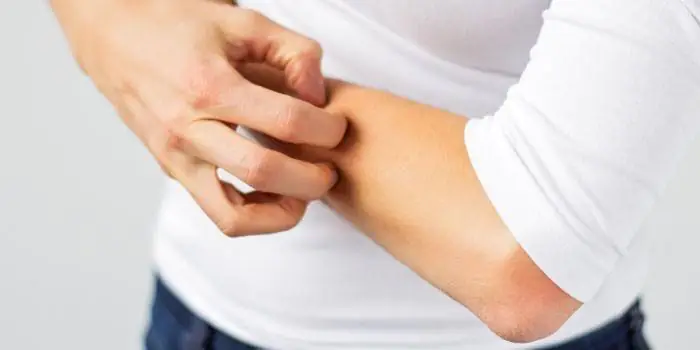
Generalized itching
This is the name given to a condition in which the entire body itches. The causes of generalized itching can be both pathological and natural. The skin on the body may itch due to prolonged exposure to the sun or rising to high altitudes, as well as the aging process of the body. As a rule, the feeling of discomfort worsens in the evening and reaches its peak at night. There are cases when the itching is generalized, but not pronounced. It manifests itself occasionally as a slight burning sensation.
Localized itching
In this case, a certain area of the skin itches and irritates. As a rule, localized itching is pathological. The most common places of damage: scalp, genitals, anal area. In addition, there are a huge number of cases when people’s ears, eyelids, nose, face, fingers, and limbs itch. It is not the irritation itself that needs to be treated, but the diseases that caused it.
Causes of itchy body skin
To get rid of discomfort, it is necessary to find out why it arose. There are many reasons for itchy body skin. It is caused by skin diseases, problems with internal organs, or even a certain emotional state. Regardless of why the skin of the body itches, this condition must be eliminated. It is worth taking a closer look at the most common factors that provoke it.
Causes of itching all over the body without rashes
A very common occurrence. The following causes of itching all over the body without rashes may be noted:
- chronic renal failure;
- old age (as we get older, the skin becomes drier, so itching may occur);
- development of liver diseases;
- pregnancy;
- mental disorders;
- pancreatic head cancer;
- blood diseases;
- blocking of the duodenal opening by a neoplasm;
- infectious invasions;
- diabetes mellitus and thyroid disorders (very common causes of itchy body skin without a rash);
- stress;
- a side effect of taking a drug.
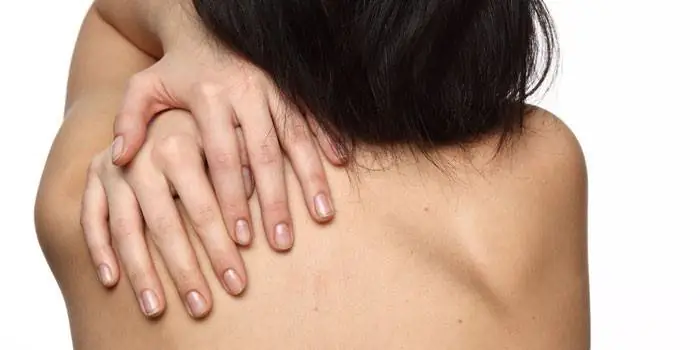
Causes of severe itching all over the body
Sometimes the irritation is simply unbearable. The causes of severe itching all over the body are:
- allergies (usually atopic dermatitis, urticaria);
- stress (the degree of irritation varies from mild and unnoticeable to very strong, causing uncontrolled scratching of the skin);
- seasonal weakening of the body (especially in people with vegetative-vascular dystonia);
- lymphogranulomatosis;
- kidney disease;
- Hodgkin's lymphoma;
- multiple sclerosis;
- erythremia.
Rash and itching on the body in an adult
The most common, but far from the only cause of such symptoms is allergies. In general, the factors that provoke rash and itching on the body in an adult are divided into infectious and non-infectious. Each group requires detailed consideration. Infectious causes of skin itching with rash:
- Syphilis. In the second stage of the disease, the body becomes covered with spots, and in the third - a small rash similar to a nettle lesion. The route of transmission is sexual.
- Lichen. Absolutely all types of rashes are characteristic of such skin lesions. Always accompanied by itching and irritation.
- Herpes. It most often appears on the face, but can also be located in other areas. It starts with a spot of redness that you want to scratch unbearably, then in its place small bubbles with water inside appear, then crusts.
- Rubrophytia. A fungus that affects the feet.
- Pemphigus.
Non-infectious reasons why the skin on the body itches and a rash occurs:
- lupus erythematosus or systemic lupus;
- seborrheic dermatitis (affects areas of the body where there are many sebaceous glands);
- hives;
- psoriasis (at first the rash does not itch, but later leads to severe discomfort);
- Diaper rash.
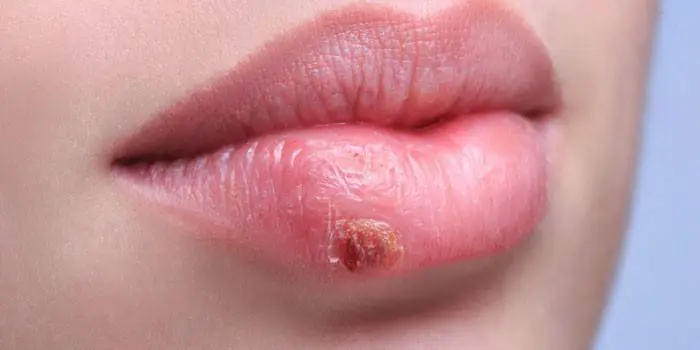
Subcutaneous itching
This phenomenon does not occur as often as others, but it causes a lot of inconvenience for both adults and children. Subcutaneous itching begins due to:
- allergic reactions;
- mental disorders;
- neurodermatitis (this disease is caused by stress);
- problems with the digestive system;
- fungi;
- parasitic infestations.
Causes of dry and itchy body skin
These two states are closely interrelated. The main causes of dry and itchy body skin are aging and dehydration. The cells gradually become less elastic than before. In addition, dry itchy skin occurs when:
- allergies;
- fungal infections;
- skin diseases;
- kidney and liver problems;
- infectious diseases;
- being in unfavorable climatic conditions (excessive cold or heat);
- use of inappropriate personal hygiene products and cosmetics;
- thyroid disease.
Rash on the back of an adult
This phenomenon, in most cases, occurs with allergies. The appearance of rashes on the back of an adult is typical for:
- hormonal imbalances (adolescence, pregnancy, lactation);
- dysbacteriosis;
- lack of personal hygiene (rare showering);
- problems with the urinary system;
- gynecological diseases;
- being in unfavorable climatic conditions;
- endocrine diseases;
- stress;
- insect bites;
- poor nutrition;
- excessive sweating.
What skin diseases cause itching on the back:
- hives;
- fungi;
- psoriasis;
- skin infections;
- scabies;
- seborrhea;
- neurodermatitis.
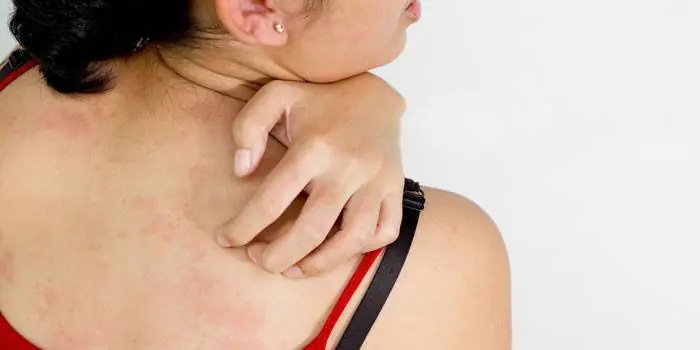
Psychogenic itching
Caused by stress, situations that provoke anxiety or emotional instability. As a rule, the appearance of psychogenic itching is typical for people over forty years of age. There are no skin changes. Patients may feel as if someone is crawling on their body. Sometimes they scratch the areas that bother them so much that wounds appear.
My whole body itches at night
Increased itching in the evening is typical for almost every person, be it a man or a woman. At night, the whole body itches because the blood vessels dilate and blood circulation increases. More heat enters the cells, which leads to increased exposure to stimuli. There is nocturnal itching of the skin of the body - the causes of which are exacerbations of the sensitivity of the nervous system caused by stress, neurasthenia, complications of any disease.
Rash on the sides of an adult
Possible reasons for this phenomenon:
- A rash on the sides of an adult occurs with certain types of herpes, especially herpes zoster.
- Scarlet fever.
- Problems with the liver or pancreas.
- Allergy.
Itching and peeling skin on the legs
Many people encounter this phenomenon. Itching and peeling of the skin on the legs can occur with:
- neurodermatitis;
- fungus;
- negative climate impacts;
- contact dermatitis;
- erythroderma;
- varicose veins;
- using low-quality skin care cosmetics;
- exfoliative dermatitis;
- diabetes mellitus;
- psoriasis;
- dermatosis;
- eczema;
- allergic reaction to foods, medications;
- thrombophlebitis;
- wearing low-quality and too tight shoes;
- dehydration.
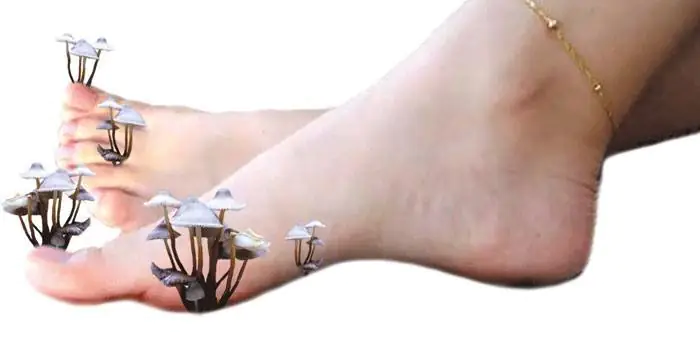
Itchy whole body and head
The causes of this phenomenon may be illnesses, but external factors cannot be ruled out. Diseases in which the whole body and head itches:
- neurodermatitis;
- scabies;
- hives;
- diabetes;
- xerosis.
The head and body may also itch for the following reasons:
- contact with external irritants (chemicals, pollen, synthetic clothing, etc.);
- increased sensitivity of the nervous system;
- excessive impressionability.
Rash on the hands of an adult
This symptom is characteristic of many diseases. A rash on the hands of an adult occurs when:
- allergic dermatitis (contact, atopic, toxicoderma);
- eczema;
- scabies;
- syphilis;
- erysipelas;
- intestinal yersiniosis;
- lichen;
- psoriasis;
- vasculitis.
Diagnosis of body skin itching
If you suddenly start itching, do not put off visiting a dermatologist. Diagnosis of body skin itching to identify a disease for which treatment should be prescribed consists of the following measures:
- initial examination of the patient (skin);
- survey (the patient must list his complaints and indicate additional symptoms);
- laboratory tests and non-invasive studies.
As a rule, the patient is prescribed an examination according to an individual program, which may include one or more of the following procedures:
- blood tests: general, biochemical, detailed, for sugar and thyroid hormones;
- X-ray;
- Ultrasound;
- stool tests: general and for the presence of worms;
- endoscopy (colonoscopy, gastroscopy, etc.);
- Analysis of urine.
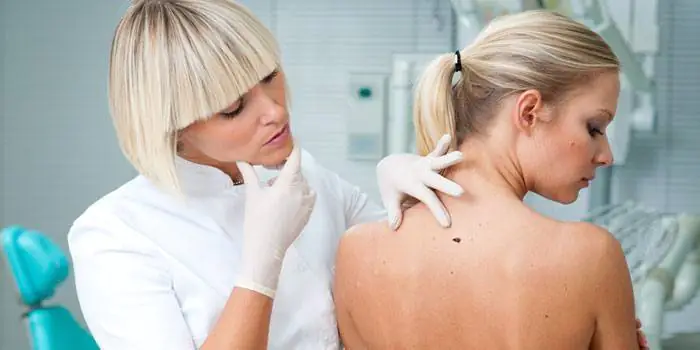
Treatment of itchy body skin
Therapy may be recommended, either medicinal or alternative. As a rule, treatment of body skin itching is carried out using the following medications:
- local antihistamines and anti-inflammatory (Bepanthena, Elokola, Fenistila, Mesoderm, Beloderm, Solcoseryl);
- antihistamines for internal use (Erius, Zyrtec, Tavegil, Loratidine, Diazolin, Cetrin);
- enterosorbents. In case of food allergies, doctors always prescribe the enterosorbent Enterosgel in a course to remove allergens. The drug is a gel soaked in water. It gently envelops the mucous membranes of the gastrointestinal tract, collects allergens from them and removes them from the body. An important advantage of Enterosgel is that allergens are firmly bound to the gel and are not released in the lower intestines. Enterosgel, like a porous sponge, absorbs mainly harmful substances without interacting with beneficial microflora and microelements, so it can be taken for more than 2 weeks.
- folk remedies (melissa tincture);
- antifungal(Fluconazole);
- ointments with glucocorticosteroids (Lokoid, Advantan).
Video
Reviews
Tatyana, 46 years old Itching of the skin of the body - the causes of which for me are always frustration and stress - appeared in my youth, and began to intensify with age. Various areas itch all the time: arms, face, stomach, legs. I try to take light sedatives, because special ointments do not help at all. I know that I need to see a doctor, but I keep putting it off.
Alexander, 36 years old The body began to itch very much a year ago, but the cause could only be determined now. It turned out that I have diabetes. The skin has become very dry, but it itches less when the sugar level approaches normal. Ointments with a cooling effect help relieve the unpleasant sensation. I tried others, but didn't see any results.
Irina, 31 years old Having become pregnant, I was faced with such a nuisance as itching of the skin of the body - the true causes of which could not be determined for a long time. It was a matter of hormonal changes in the body, and I suspected the worst: fungus, psoriasis, lichen. The stomach and legs itched the most. I got rid of discomfort by rubbing a glass of lemon balm tincture into my skin every day.
Human skin is very sensitive and susceptible, often exposed to the negative effects of various factors. Dryness is one of the common problems that requires immediate treatment. This phenomenon can be either congenital or acquired during life. Dry skin causes significant discomfort: peeling, pigmentation, hardness and severe itching. If you do not get rid of unpleasant sensations in time, the situation will only get worse.
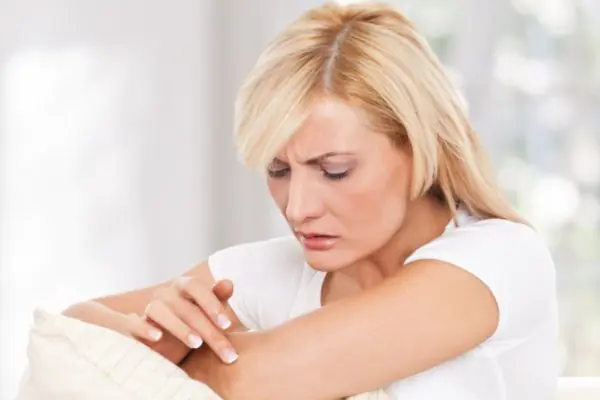
Causes of dry and itchy skin
The causes of dry skin and itching may vary. They depend on changes in the environment, as well as pathological processes within the body. The most common reasons include:
- The use of cosmetic products with surfactants (surfactants), which can cause dehydration and some allergic reactions: from mild irritation to dermatitis.
- Damage to the epidermis during hot baths, as well as after visiting a swimming pool where the water is chlorinated and disinfected.
- The effect of dry air on the epidermis in rooms with air conditioning and heating devices, as a result of which the fatty protective film is destroyed.
- Unfavorable environmental conditions; negative effects of ultraviolet rays in the summer.
- Hormonal imbalance.
- Poor nutrition, lack of sufficient fluid in the diet, which leads to dehydration of the skin.
- Genetic predisposition.
- Skin diseases and pathologies of internal organs.
- Vitamin deficiency or excess vitamins.
- Long-term use of antibiotics and medications.
- Frequent stressful situations.
- Bad habits.
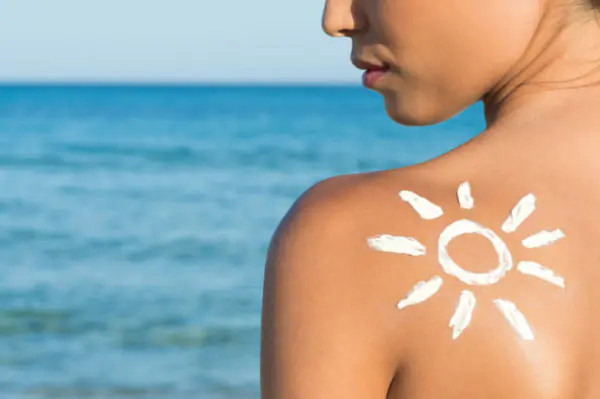
The danger of flaky and dry skin is that the risk of microtrauma increases. Through damaged areas, various infectious agents that can affect organs and systems easily penetrate into the body. In addition, the skin loses its attractive appearance: it becomes tense, wrinkles and other signs of premature aging appear.
What diseases cause dry skin?
Very often, various diseases become the cause of dry skin. In particular, such a situation may arise in the following diseases and situations:
- skin diseases of hereditary and acquired nature (dermatitis, psoriasis, herpes, ichthyosis, scaly lichen and others);
- chronic intoxication;
- dystrophy;
- diabetes;
- allergic reactions;
- renal failure;
- problems with the endocrine and digestive system;
- lack of thyroid hormones (hypothyroidism);
- hypovitaminosis;
- seborrhea;
- autoimmune disorders (Sjogren's disease).
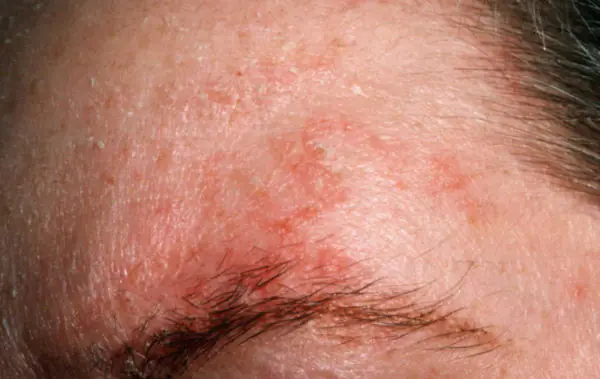
How to deal with dry skin: care products
It is advisable to eliminate any cosmetic defects and unpleasant sensations using an integrated approach. A dermatologist will help you choose the right method for treating dehydrated dermis.
Faced with this problem, many people prefer skin care products. They include:
- means for exfoliating dead cells (peelings, scrubs);
- products with natural ingredients (mineral oils, naturally occurring fats, such as glycerin, beeswax).
Peels and scrubs can be used no more than once a week, and the second group of products is suitable for daily use at any time of the day, but preferably before bed after hygiene procedures.
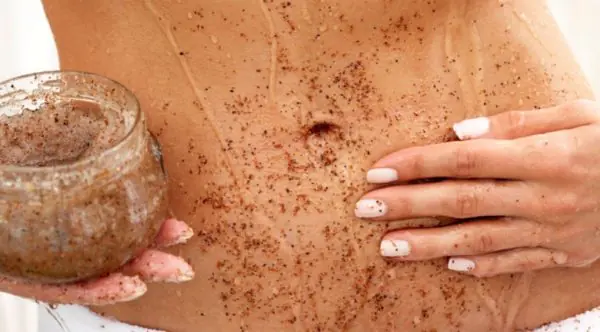
It is worth noting that oils are a good way to maintain moisture in the outer layers of the skin, and the effectiveness of lotions is enhanced by the fatty acids, ceramides (components of the skin barrier layer) and complex lipids they contain.
It is necessary to use protective cosmetics all year round in any weather. These can be balms against chapped lips in winter, lifting, smoothing masks, insect repellent sprays in the summer. We should not forget about the choice of clothing: it should be made from natural fabrics and be appropriate for the season.
Cold compresses, which dilate small arteries and relax muscles, as well as ointments based on hydrocortisone (a synthetic glucocorticosteroid drug) are highly effective.
Caring products actively eliminate itching, tingling and pulsation of the epidermis, not only cleanse it, but also stimulate the regeneration of damaged cells.
Recommendations from nutritionists

In order to speed up the effect of anti-itch medications, nutritionists give the following recommendations:
- Avoid crash diets. They lead to vitamin deficiency, a lack of nutrients in the body, chemical elements and organic compounds. This causes dry skin. You need to lose excess weight gradually to avoid sagging and stretch marks.
- Change your diet. Add foods containing vitamins A and E: dairy products, liver, buckwheat, carrots, cabbage, peas, greens, cabbage, black currants.
- Limit the intake of diuretics and drinking aids for weight loss. They remove more fluid from the body than normal, dehydrating it.
Pharmacy moisturizers
Many pharmaceutical companies offer their moisturizers against dry skin. Various preparations have been created for normal, sensitive, combination and other types of skin.
Moisturizers include lotions, cosmetic oils, creams, and milks. They help the skin, the largest organ, to systematically receive water and protect against the premature appearance of wrinkles.
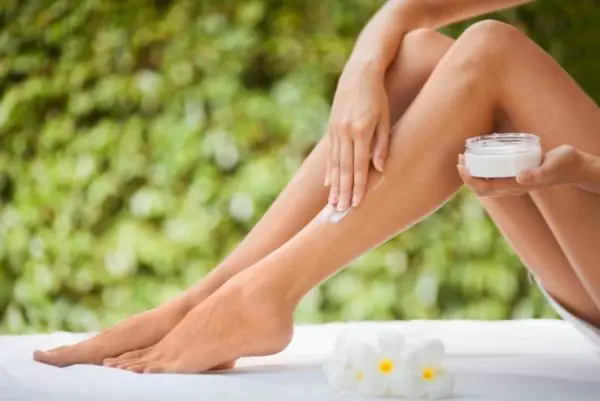
When choosing a product, you should focus on the following individual components:
Hydrant creams are popular. They have long become a basic remedy for people suffering from seasonal dry skin. Such creams bring water to the inner layers and nourish the cells with the necessary amount of liquid.
Particular attention should be paid to the composition of the moisturizer. Glycerin, water and chia seeds are the most important ingredients needed for intense hydration.
Traditional medicine recipes
Despite the innovations of modern medicine, folk remedies do not lose their relevance.
List of popular recipes:
- Mix avocado and banana crushed in a blender with 100 ml of cream and 100 grams of butter. Add rose essential oil. Apply to the itchy area for 20 minutes and rinse with warm water.
- Mix honey and olive oil in equal proportions. After 15 minutes, wash off.
- Grind the carrots, add oatmeal, and apply the resulting slurry for 15 minutes.
- In order to remove dryness on your hands, you need to apply mashed potatoes to them, wrapping them in plastic. To enhance the effect, you can add 1 tbsp. sour cream, yolk and lemon juice. Keep for 20 minutes.
- Apply 1-2 tsp to problem elbows. starch, pre-mixed with warm water. After the procedure, apply moisturizer.
By following these recommendations and using recipes, you can not be afraid of skin problems.
Itching is one of the most intrusive and unpleasant sensations for a person. Even the word “itch” gets on your nerves. To understand how to get rid of this phenomenon, let’s look at its causes.
- What you need to know about itchy skin?
- Types of itching
- Causes of itchy body skin
- How to get rid of severe itchy skin all over your body
- What cosmetics will help with skin care?
What you need to know about itchy skin?
It would seem like a trifle, but what a worry! Previously, itching was considered a type of pain. Subsequently, they came to the conclusion that this is not entirely true, but they recognized its connection with the nervous system - after all, the signal that it is necessary to scratch/rub/stroke this or that area of the skin comes from the brain. Let's take a nice example: a butterfly landed on your hand. The skin sends information through nerve endings (it’s ticklish) to the brain, and a signal is immediately generated (look and, if anything, shake it off; check if everything is okay).
Tickling and light touching also cause itching. Sometimes it's very nice.
© Getty Images
However, let's get back to the itching. Its reasons are, firstly, not so pleasant, and secondly, not so obvious. In any case, this sensation causes a scratching reflex to, if possible, get rid of the source of the itching and restore comfort to the skin.
Types of itching
The causes of itching turned out to be so numerous that in the world (and in our country) in some medical clinics there are entire centers dedicated to this problem. It is clear that everyone is familiar with itching as a result of a mosquito bite, but if skin itching throughout the body becomes the cause of insomnia, it must be dealt with seriously. In addition, like pain, it can vary in intensity from mild to unbearable, causing you to scratch the skin.
Based on the scale of manifestations, doctors divide itching into two types - localized and generalized.
Localized
Generalized
This is already a serious story. You can't figure it out without a qualified doctor. Severe itching all over the body can be the result of both a skin infection and serious internal diseases, even mental problems.
Causes of itchy body skin
The range of these reasons is huge, let's start with the most common and simple ones.
Excessive dry skin
Dry skin leads to disruption of the integrity of its hydrolipid mantle. If the skin becomes dry and flaky, it is usually accompanied by itching. Unpleasant sensations can occur after a shower, for example, if you use soap, which in combination with tap water dries out the skin. In this case, the itching should be regarded as a request for help. You no longer have enough strength to correct the accumulated damage to your skin. You need powerful moisturizers.
So, provocateurs that can make just dry skin very dry:
very low air humidity;
Skin restoration after sunburn, aesthetic procedure
Indeed, beauty often requires sacrifice. Especially hair removal. Itching often accompanies the recovery process. © Getty Images
Indeed, “it itches means it heals.” Here you will have to be patient and use soothing, moisturizing and regeneration-accelerating products. Histamine, which is produced in areas of damage, is to blame. One of its tasks is to increase blood circulation in this area, which speeds up the healing process.
Allergies and urticaria
Parasites, fungi, bacteria, viruses
Their army is innumerable, ranging from scabies mites (which are very easy to pick up) or lice, to pool fungus, staphylococcal infection (impetigo) and viruses, including herpes. Many diseases like chickenpox, which are accompanied by a rash, inevitably cause the skin to itch. Obviously, in this case, the doctor will prescribe the necessary treatment against the disease. The itching will also go away. In the future, to strengthen the skin’s immunity, it is important to moisturize it well and prevent excessive dryness.
Skin diseases
Psoriasis, eczema, atopic and seborrheic dermatitis - many dermatological diseases of a non-infectious nature are also accompanied by itching, because they are associated in one way or another with skin damage, disruption of its microbiome and, as a rule, excessive dryness.
In such situations, the doctor prescribes not only treatment, but also daily care that will help minimize the manifestations of the disease and keep it under control.
Vitamin and mineral deficiency
It is clear that for such pronounced manifestations the deficiency must be very serious. However, it is possible. A lack of vitamin D, iron, B vitamins, and vitamin A negatively affects the skin, leading to flaking and itching. But everything passes without a trace, you just have to satisfy your vitamin and mineral hunger.
Diseases of internal organs and systems
Skin itching, usually generalized, is often accompanied by very serious diseases, including diabetes mellitus, other endocrine (hormonal) disorders, blood, liver, kidney diseases, neurological and oncological problems. Therefore, in no case should you neglect this symptom and postpone consulting a doctor.
If the cause of itchy skin is not obvious, be sure to consult a doctor!
© Getty Images
Psychogenic itching
Psychogenic itch makes us itch when we read an article about itching or see someone scratching. This form differs from the others in the complete absence of visible and objective reasons for itching. This happens in moments of stress and excitement - due to nervousness. But not only. Sometimes this problem interferes with living and sleeping.
Generalized psychogenic itching may accompany a depressive state.
Why might your body itch during pregnancy?
The reasons can be very different.
Hormonal activity. Itchy skin all over the body can be associated with the action of hormones. Some (chorionic gonadotropin and placental lactogen) generally appear in the body only during pregnancy. The ratio of others changes. Moreover, it changes constantly, because first their task is to ensure the normal development of the fetus, and then to start the birth process. Fluctuations can be very significant: for example, progesterone and prolactin increase several times! And both internal organs and our skin react to these changes.
Skin stretching. The belly becomes rounder, the breasts become larger, the weight increases - and the skin stretches, it can itch and even peel off. For those with dry skin, the itching can be very severe. They need to use intensive moisturizers. Moisturizing cream will help with severe weight gain and with multiple pregnancies, when the skin is forced to “work” in extreme mode.
Allergic reactions. The cause of thin skin in the early stages of pregnancy may be an allergy to dust, animal hair, and so on. Even if you have never suffered from it, you should exclude this factor.
Increased sweating. It can be caused by the action of the same hormones or sudden weight gain. The skin itches the most in the armpits, folds, palms and legs below the knees - to relieve irritation, drying agents and comfortable clothes made from natural fabrics will help.
How to get rid of severe itchy skin all over your body
First, go to a dermatologist for a consultation. As we see, there can be many reasons, and very serious ones. At the same time, you can reconsider traditional skin care.
Alexander Prokofiev, medical expert of the La Roche-Posay brand, offers three universal tips for caring for your body skin:
Use only mild products for cleansing, avoid soap;
apply emollients (moisturizers) several times a day, the skin should never remain dry;
try not to scratch the skin, as it is damaged, nerve endings are irritated and the vicious circle of atopy “itching-scratching” starts. Instead of using your own nails, it is better to use skin soothing products, such as Lipikar Stick AP+.
Cosmetical tools
Depending on the cause of the itching, you should choose suitable cosmetics.
If the problem is dry skin, then any moisturizing creams and body oils will improve the situation.
In the case of skin prone to allergies, it is necessary to give preference to hypoallergenic cosmetics. Some brands, for example, La Roche-Posay, develop entire lines for complete care specifically for such skin.
What cosmetics will help with skin care?
It is necessary to pay special attention to the stages of cleansing and moisturizing, and also not to forget about the dangers of the sun.
Cleansing
When itching and sensitive skin, it is important to choose shower gels as carefully as possible.
Nourishing shower cream Nurturing Body Washing Cream series Crème de Corps, Kiehl’s not only cleanses, but also softens dry and sensitive skin thanks to shea and jojoba oils.
Lipid-replenishing softening oil for bath and shower Lipikar AP+ Oil, La Roche-Posay Addresses extremely dry skin of adults, children and babies. Contains components aimed at restoring the skin microbiome and reducing discomfort caused by dryness.
Hydration
Moisturizing “Melting Body Milk”, Garnier, in addition to nourishing oils, it contains a complex of bifidobacteria, which moisturizes and strengthens the protective barrier of the epidermis. Oat milk additionally soothes the skin.
Moisturizer, CeraVe addressed to dry and very dry skin of the face and body. Thanks to ceramides and hyaluronic acid, it restores moisture balance. The product is hypoallergenic. Visibly soothes skin.
Ultra-fresh body gel Aqua-Gelée, Biotherm contains a moisturizing complex and is instantly absorbed, suitable for sensitive skin.
Nourishing body cream Creme de Corps, Kiehl’s – thick and rich, it is rightfully considered one of the best moisturizers from Kiehl’s. The cream contains squalane and nourishing oils. Easily absorbed and moisturizes even very dry skin.
Skin Fitness Instant Smoothing Body Treatment, Biotherm improves skin texture and instantly visibly fills it with moisture. The skin becomes soft, smooth and delicate.
After the sun
Refreshing after-sun cream “Expert Protection”, Garnier with vitamin E soothes, gives a feeling of comfort, promotes the rapid restoration of the skin barrier.
Moisturizing after-sun milk Soleil Bronzer, Lancôme with hyaluronic acid and a rich set of vegetable oils nourishes and moisturizes the skin after sunbathing.
Mineralizing thermal water, Vichy can serve as a kind of SOS tool. It soothes and restores the protective functions of the skin.



